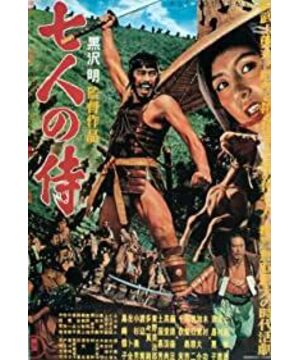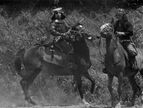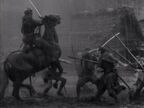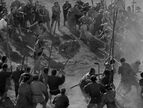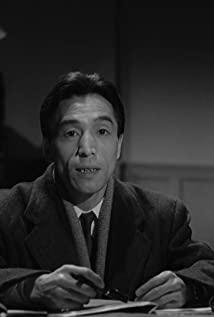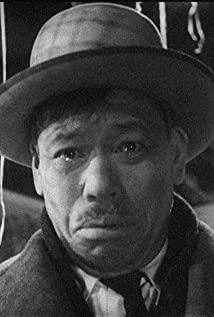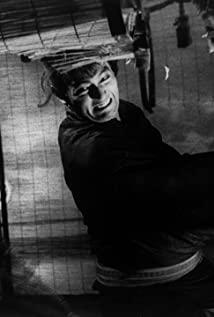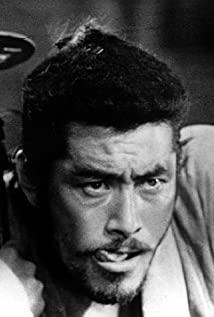It is not a retelling of the story, but to learn about historical allusions and social patterns through the story.
1
Kurosawa is a world-recognized film master, and a prolific master, with a lot of classic films. In the 1950s, there were "Rashomon" and "Seven Samurai". In the mid-term, there were business cards such as "Warring States Heroes" and "Intentional Stick". In the 1980s, several epic films such as "Shadow Warrior" and "Ran" were filmed.
Kurosawa has a great influence on our Chinese filmmakers. For example, some of the films we mentioned earlier, Jiang Wen's "The Devil Is Coming", are very close to the "Seven Samurai" in tone style. Zhang Yimou's "Shadow" has the same theme as "Shadow Warrior", and "Hero" is very close to "Chaos" in terms of color and scene scheduling. Chen Kaige is known in Japan as "China's Kurosawa Akira". The "Assassination of the First Emperor" mentioned earlier is close to Kurosawa Akira's film in overall style.
Some people have learned his form, and some have learned his god, but so far, there has not been a master in the Chinese film industry who has both god and god like Akira Kurosawa.
Now the more popular game "Red Dead Redemption", its movie of the same name is also adapted from Kurosawa Akira's movie "Intentional Stick", which means bodyguard in Japanese. Sergio Leone's Red Dead and The Past series, I have said before.
So, the most difficult thing to say about Kurosawa's movie is to choose. Let me talk about "Seven Samurai", which is a shining classic in the history of world cinema.
Because the film is relatively old, we can't just tell stories, we must combine Japanese history and social system to understand some of the characters' motives and choices. Some details will be skipped first, and then we will find some wonderful sections to analyze later.
2
The story takes place during the Warring States Period in Japan, about 1587, when Toyotomi Hideyoshi took over. At that time, the civil war in Japan had been fought for more than 100 years, and the society was rather chaotic, with many bandits and bandits.
Farmer Liji’s village is plundered by bandits every year. They want to hire warriors to fight bandits to protect the village, but they can’t afford the money and can only provide rice for three meals a day, so they hope for those poor ronin who have no food to eat. .
Here we have to understand a little bit about the Japanese social system at that time. The Japanese system was learned from China. The top class was the emperor and the nobles, the main class was also the "senior, peasant, business", and the lowest class was the untouchables. But what is different from China is that Chinese "shi" are mostly civilian officials, while Japanese "shi" refers to waiters, samurai who protect someone.
Although the samurai are also nobles, they have no land and can only live on salary. If the city lord they protect is killed or they are expelled, they can only become ronin. Ronin either finds a new master or becomes a bodyguard to make money, which means "sticking with his heart."
Liji and the others want to find Ronin to help them deal with the bandits, but they don't have the money. Of course, no one will easily die for them. The four farmers wandered in the town for a few days and found nothing. They were arguing about whether to give up, but they witnessed a bizarre incident with their own eyes.
A robber kidnapped a few-year-old child and hid in the barn. Everyone didn't know what to do. He asked the samurai guards passing by to save the child. The guards agreed after asking about the situation.
Then he borrowed a monk's broken robes and asked the monk to help him shave his hair. He pretended to be a monk and gave the robber a rice ball. He rushed in to kill the robber and rescued the child.
Katsushiro, the rich son of the rich family, admires Kanbingbei for his extraordinary skill and resourcefulness. He wants to learn from his teacher and follows Kanbingbei all the way.
Liji also saw hope, and hurried up to beg Kanbingwei. Faced with such an impossible task, Kanbingwei looked helpless, and repeatedly declined. When he heard a few homeless men say that in order to find samurai to fight bandits, these farmers only eat tares, which can cause night blindness. With compassion, he agreed.
According to Kanbingwei's estimation, at least seven warriors are required to organize and train villagers to fight against bandits. Then he recruited with Katsushiro for a few days, and 4 samurai joined.
Gorobei respects the character of Kanbingbei, who used to be Shichiroji under Kanbingbei, Heihachi who can only cut firewood and swordsmanship, and Kuzo of Wugong Zhuojie.
Someone may be surprised, why are there so many ronin in the city who have no food to eat? As mentioned earlier, the civil war has lasted for more than 100 years. In the Spring and Autumn Period of China, there were more than 140 vassals, large and small, but by the end of the Warring States period, we all know that only the seven heroes of the Warring States Period, Qi Chuyan, Han Zhao, Wei Qin, were left. Everything else was eliminated by mergers. The name "Warring States" in Japan is based on China's "Warring States" era. The social situation is similar. Because many small vassals perished, so there were more Ronin.
Several homeless men recommended a drunk warrior. Kanbingbei discovered that this person had been seen before and suspected that he was not a samurai. This guy actually took out his family tree. Kanbingbei laughed after reading it. According to the family tree record, he The man named Kiku Chiyo should be only 13 years old, which proves that he is illiterate and cannot be a samurai.
Although the Japanese samurai class is not rich, they are all aristocratic elites. While learning martial arts since childhood, cultural learning is also indispensable, including calligraphy, painting, tea ceremony, chess and so on. Note that in the movie, the names Kanbei, Katsushiro, and Kikuchiyo are temporary names without a surname. Only nobles can have a surname. After a samurai has made contributions, he will be given a surname by the emperor or superior, such as Toyotomi Hideyoshi's original name. His name was Hashiba Hideyoshi, whose surname was given to Toyotomi by the Emperor.
Farmers are common people and do not have surnames. In this situation, it was not until the Meiji Restoration 300 years later that the hierarchical system was eliminated, and farmers had surnames. Therefore, many strange surnames appeared in Japan later, all of which were made up by themselves.
3
Kanbei didn't have time to recruit the seventh samurai, and then he took 5 samurai back to the village with the peasants. Katsushiro and Heihachi had no combat effectiveness. But Kikuchiyo was following, unable to drive away, and everyone gradually accepted the seventh fake samurai.
After returning to the village, there was no warm welcome as expected. On the contrary, no villager could see it. The villagers are afraid of everything. They are afraid of bandits and samurai. Kiku Chiyo secretly sounded the clapper of the warning, and the whole village ran out in a panic.
Why are farmers afraid of samurai? Although farmers have land, they are common people. According to Japanese law, samurai have the right to kill common people who are disrespectful to them, and they are not responsible. In other words, there is basically nothing to restrain the sword in the samurai's hand, only to see if he has a kind heart. Before the samurai came, farmer Manzo also forcibly cut off his daughter Shino's hair and pretended to be a man in order to avoid the samurai's molesting.
Therefore, asking the samurai to protect the peasants is exactly the peculiarity of this movie. You must know that this is fundamentally different from the Chinese knights who help the weak. The core of the so-called Bushido spirit is to protect people worthy of protection with their lives. Perhaps they have never thought about protecting the inferior peasants, or they are just angry that the noble samurai turns into a bandit robber.
Although the village is not large, it is well-connected. With a mountain behind it, cavalry can rush down from the mountain. There is a wheat field in front of it, and a small stream flows by.
The Kanbingwei’s strategy of defending the city is to release water immediately after harvesting the wheat, turning dry land into paddy field, which can block the most open south, and the cavalry can’t assault. Leave the entrance to the north alone. You can't hold fast, leaving a gap to lure the enemy into deep, and then divide and kill. He firmly believes that "a good city must have a shortage."
The battlefield is so scattered, of course, it can't be held by only seven people, only the organization and training of the villagers. It is indeed not an easy task to train a group of farmers to become soldiers in a short period of time, and there is a lack of weapons.
The glib mouthed Kiku Chiyo even uttered words from the villagers. They actually collected a lot of weapons and equipment, all of which were snatched by killing the samurai during the war. Several warriors were filled with grief and indignation, and Kuzo even wanted to kill everyone in this village. In fact, these few of them had once defeated and became desolate warriors. The desolation was unforgettable.
Kiku Chiyo jumped up and said something, saying that farmers actually have everything, they are the most cunning and selfish, but who caused all this? It is the nobles and the samurai. In the successive wars, the government has to collect more taxes, the bandits have to rob, and the wandering warriors are also a threat. Kanbei realized that Kikuchiyo might have been born as a farmer.
However, Katsushiro has another adventure. His kid travels alone to gather wildflowers, and accidentally ran into Shino dressed as a man. Katsushiro wanted to show his authority as a samurai. He wanted to catch Shino to participate in training. Finally he caught him and rubbed it on the ground, but he felt that he caught a lump of soft flesh. Katsushiro realized that this was a woman who had never seen the world. The kid was so frightened that he had a wonderful love.
Everything was deployed in an orderly and tense manner, but some farmers heard that they had to abandon the houses outside the stone bridge. This was a choice of "letting a small house for everyone". Of course, the peasants who lived in those houses did not do it. For the first time, Wei showed his sternness as a commander. He drew his saber. Anyone who dared to leave his post without permission was cut off. He was finally suppressed.
Then everything went well, and the samurai and the peasants got along well. The wheat has also been harvested, but the bandit has not shown up for a long time.
4
When I was bored, Shino and Katsushiro's love made a little progress. Shino pulled Katsushiro to tryst, and all kinds of teasing were all lying in big characters. This kid actually didn't dare to go, and then Shino scolded him as a dog.
Here you need to know that in ancient Japan, a samurai and a peasant cannot get married. Katsushiro didn't dare to go up, which meant that he still had some conscience and couldn't be responsible for the affairs. Shino is very simple, instead of being abused by bandits, it is better to be cheap and handsome.
When he was embarrassed, Katsushiro found the trail of the bandit.
The three robbers came to find out the news, presumably they wanted to see if the wheat had been harvested. They also found the samurai and wanted to escape back to report. Kanbei knew that he could not go back and report the letter, so he sent Kuzo and Kikuchiyo to intercept. Kuzo showed superb martial arts. Killing two bandits in seconds was like walking in a leisurely garden. The other was captured by Kiku Chiyo and Katsushiro was lying in the grass watching the game, shaking with fright.
The captured bandits confessed everything, but the Kanbing Guard was unable to stop the angry villagers from killing the captives. After all, they hated them.
Kanbingbei learned some information from the captives, so he must send someone to inquire about the reality. Liji was the guide, Kuzo, Heihachi and Kikuchiyo rode horses overnight to spy on the bandit camp.
Kikuchiyo instructed Liji to set the fire, and was spotted by a woman, but the woman had no warning, instead she showed a weird smile and let the fire spread. Then the bandits in the house panicked and ran out, Jiuzang took the opportunity to kill a few. After seeing the woman, Liji ran desperately to rescue her. Instead, the woman reincarnated and threw herself into the fire. Liji wailed in front of the fire, and Pingba ran over to Laliji, but was shot and killed by the bandit’s musket. It turned out that the woman was Liji's wife, who had been dominated by bandits for a long time.
Why do bandits have muskets? It was 1578, and the Portuguese brought the musket to Japan in 1543. In fact, there were muskets in the Song Dynasty in China, and the firearms in the Ming Dynasty were very developed. Zheng He's voyage to the West was the strongest naval fleet in the world at that time. The Emperor Kangxi of the Qing Dynasty also used red cannons when he fought Russia. After arriving at Emperor Qianlong, he was slowly lost. It is a bit unbelievable. The decline of the Qing Dynasty began with Emperor Qianlong.
Before the real battle started, the Seven Samurai sacrificed one, and the villagers knelt down on the hillside to mourn for Heihachi. The depressed Kikuchiyo ran back to the village, erected a battle flag sewn by Heihachi himself on the roof, fluttering and hunting in the wind.
At this time, the bandit cavalry rushed out, and all of them were killed. Kiku Chiyo was so angry that there was nowhere to spread his grievances, and he jumped up with excitement.
Kanbingbei commanded in the middle of the village, Katsushiro served as the commander, and the others guarded the three-way intersection. After several trials, all the bandits would retreat.
In the evening, another wave of sneak attacks was organized, but a few corpses were still left behind and returned without success. In the end, the bandit found that only the north side could rush into the village, and they attacked the north side one-on-one. This hit Kanbingwei's strategy.
For the defensive side, the biggest threat is the enemy's three muskets. They don't know where they are hidden and when they will sound. Jiuzang entered the mountain alone when it was dark, and did not return until dawn, holding a musket in his hand, and said "kill two." Katsushiro looked at Kuzo's eyes, and they couldn't bend it. He felt that this kid loved Kuzo more than the beauty of Shino.
Kiku Chiyo is the kind of person who refuses to admit defeat. Seeing Katsushiro's admiration for a long time, he actually left his position and sneaked into the mountains in broad daylight, and also grabbed a musket. But it also angered the bandits, a wave of fierce offense came, and the defense was very difficult. In the melee, Goro Biebe was killed by a gun. There are five remaining seven samurai. Kikuchiyo sat at the tomb of the samurai with grief.
Kanbingwei calculated that there were 13 people left on the opponent. Two days of fierce battle, the food had been eaten, and the attack would inevitably come at dawn. That would be the final decisive battle. He ordered two people to stay on guard at each post and the others to rest.
And the villagers actually took out the wine and meat. Sure enough, Kiku Chiyo said that the farmers are the most cunning. Until this critical moment of life and death, the hidden good things will never be shared.
Just a little free, Shino rode the blazing bonfire, once again hooked Katsushiro's soul, successfully straightened him, and the two settled the matter in the thatched hut. It wasn't until Wan Zao shouted to find her daughter that Shino walked out slowly, shyly. Kanbei heard that the samurai had defiled the woman's innocence. At first, he was furious. Knowing that Katsushiro did it, he didn't know what to do. This tragic love was destined to be fruitless.
The next day of the decisive battle, the heavy rain continued. Kanbingwei still defended according to the strategy established the day before. Seeing that victory was in sight, the bandit leader sneaked into the village secretly, hid in the hut and shot him to death for a long time. Kikuchiyo became anxious and went straight. He rushed forward and was shot. He killed the boss with a single breath before he fell to the ground and died.
After this battle was fought, the 40 thieves were wiped out, and the Seven Samurai sacrificed 4 men. The farmers who survived happily sang songs to grow rice. Kanbei, Shichiroji, and Katsushiro were about to leave, but there was no one to see them off. Katsushiro looked at his little lover Shino affectionately, and he didn't want to leave for a long time.
Standing at the foot of the samurai tomb, Kanbei sighed that he had lost another battle this time. Shichiroji was puzzled. Kanbei said that it was the farmers who had won.
5
"Seven Samurai" was a movie 65 years ago, and it still looks very attractive. It created a category of film narrative , a group play mode that gathers a group of people to complete a certain task, and it started with this movie. Hollywood has made many remakes of "Seven Samurai". The most famous is "The Heroic Seven Dragons" in 1960, which has also been translated as "Seven Heroes and Dangers". Hong Kong has also remade "The Loyalty and Heroes" starring Zheng Shaoqiu. It also includes many imitations of later generations, but no group hero movie can match this "Seven Samurai".
In China, Jiang Wen’s "The Devil Is Coming" is relatively close in terms of visual style and human nature, but it does not have the complex story and many characters of this movie, nor such thrilling battle scenes. Even if it is audiovisual language, After 60 years, there is still no one to surpass.
Let's not analyze the audio-visual language, first make the narrative clear.
The film lasts for three and a half hours, and it doesn't look tired at all, of course it is a narrative technique. From the farmer’s search for the samurai, to the design of each samurai’s appearance, and the organization of the battle behind, there are thought-provoking pains every few minutes, and an unexpected humor from time to time. The whole story is advancing with joy and sorrow. The control is very comfortable.
The character Kikuchiyo is the soul of the whole film. We can say that "Seven Samurai" is the "seventh samurai". And his life experience has always been a mystery. From the beginning of following Kanbingbei for no reason, to presenting a fake genealogy to prove his identity, that is to say, he wants to be a samurai, but in reality he is a farmer.
In ancient Japan, social class was an unbreakable barrier. For wealthy businessmen who wanted to raise their sons to class, the feasible way was to become son-in-law in a samurai family without a son, but they had to use the surname of the samurai family. And Kikuchiyo's act of impersonating a samurai is actually illegal.
Later in the film, a farmer was reluctant to leave his house and was killed. Kikuchiyo rescued the baby in his mother's arms, sitting in the creek and crying, saying that the child was just like his life. Only then did Kikuchiyo find out what Kikuchiyo really was. His identity is actually a wandering farmer orphan, and he doesn't even know his own name. This line is buried far away, making the characters full of mystery. But Kikuchiyo is actually in the middle of the two classes. He knows farmers best, but he doesn't want to admit that he is a farmer, and wants to prove that he has the ability to be a samurai.
Kiku Chiyo is the most important character in both aspects of advancing the plot and providing laughs. His final sacrifice seems to be deliberately made by the creator. Such a person is at the center of the contradiction between the two classes. It is both ridiculous and sad, but as a samurai helping the peasants to fight against the bandits, his sacrifice has sublimated the character's soul.
While the film reveals the tragic nature of the samurai class, it also pays high respect to the Bushido spirit. It should be noted that the term "Bushido" was officially adopted only after this. In 1598, Toyotomi Hideyoshi died of illness, and Tokugawa Ieyasu was in the position to implement a stricter hierarchy and imprison the samurai class more severely.
Kikuchiyo's actor Mifune Toshiro, and Kurosawa Akira are a match made in heaven. Almost all of Kurosawa's early films starred Mifune Toshiro, known as the "international Kurosawa, the world's three ships."
Liji is of course the representative of the peasants. Compared with other peasants, he is one of the most stalwart against the bandits. He has never explained why, and often gives some unreasonable abnormal emotions, which makes people wonder. There must be something else. Hidden, it was not until the bandit camp was attacked and Liji's wife appeared, that he realized that this was the "hate of taking his wife."
This script actually contains a lot of Japanese folk tales. For example, Kuzo, a high-powered martial artist, refers to the legendary samurai Miyamoto Musashi. There may be some things that foreigners can hardly understand.
When I told the story, I already mentioned some social systems and historical allusions by the way . The source recommended a book "Chrysanthemum and the Sword" . This book is a survey report of American scholars studying Japan’s national conditions and people’s conditions at the end of World War II. The chrysanthemum is a symbol of the Japanese royal family, and the sword represents the samurai class.
The Americans were completely unfamiliar with Japan during World War II. Before they decided to drop atomic bombs on Hiroshima and Nagasaki, they conducted a lot of social investigations and finally decided to keep the emperor and bet the Japanese would surrender. Facts have proved that American scholars have thoroughly studied the national character of Japan. The victory of war is by no means a simple and rude conquest by force. At that time, Japan boasted about Haikou and captured all of China in three months. It just underestimated China’s land area and the Chinese nation’s sense of resistance. Later, it fell into the vast ocean of People’s War. Thoroughly researched.
6
So the most powerful aspect of "Seven Samurai" is that it thoroughly analyzes the contradictory social pattern in Japan and the inevitable tragic ending of the samurai class.
Where did the tragedy of the samurai come from? Fundamentally, it is still ideology. Japan has learned China's Confucian culture and social system. The main religion is also Buddhism, which was passed down from China, but they have abandoned the most important things.
We say that in ancient China, the country was governed by "loyalty, filial piety, benevolence and righteousness." This thing now seems to have limitations, but in ancient times it was a relatively complete system. Japan only learned "loyalty and filial piety", but abandoned the more important "benevolence and righteousness."
We in China speak of loyalty and filial piety, but the upper class has to be benevolent and righteous to the lower class. If an emperor is stupid and innocent and does not practice benevolent governance, the common people will surely rise up; if the parents are guilty, their sons can also kill their relatives.
The bottom Japanese are loyal to the emperor and filial piety to their parents and elders, while the high-level have no restrictions, which leads to the arrogance and domineering of the upper class and the brainless obedience of the lower class. The emperor has not fallen down since its birth. In the hearts of the Japanese, the emperor is a god in the sky and does not bear any human sins. Even the parents have irresistible authority, and the superiors have the same to the subordinates. This creates a very abnormal and depressing political environment. Japan has always had a very high suicide rate.
The samurai class speaks of nobles, but they were born as slaves to high-ranking nobles, and must be loyal and filial all their lives. Even if there is any dissatisfaction, the only way to commit suicide is by caesarean section. But the samurai are nobles and have the right to use swords against common people, which in turn allows them to have no scruples and develop a kind of arrogant character. At the same time, the learning of culture makes them knowledgeable and polite. Except for the eclectic counterfeit of the seven samurai, Kiku Chiyo, the others were very restrained in their speech and behavior.
Even if the samurai is like this, the peasants are even more sad. During the Warring States period, the peasants’ taxes were 40% to 80% of the income from all fields. Each place is different, and each town has its own policy. If there are bandits plundering, then the top is destroyed. Disaster. They also naturally developed a kind of cunning traitor, looking weak, but they were not merciful at all to kill the samurai to grab the weapon. And these weak-looking peasants were almost all accomplices in the invasion of China more than 300 years later.
Japan is an island country in the Pacific Earthquake Belt. The northern mountainous area is covered with snow all year round, and there is very little land suitable for cultivation. The products are extremely scarce. Later, the reform of the Meiji Restoration achieved great success. They saw that the surrounding countries were all waiting to be slaughtered. Lamb. It is the cruel living environment that created the greed and cruelty of the Japanese.
Why does Yi Ge spend so much time studying the Japanese social system? As a Chinese, we must clearly know that Japan will always be the most dangerous enemy of the Chinese nation in the past, present, and in the future, and we must be especially vigilant against these unkind people. Righteous white-eyed wolf, the kind of greed and cruelty is written in his genes. There are some militarists who never admit their crimes of aggression, not because of cunning, but because they have never felt that there is anything wrong with aggression. "If you are defeated by your ability, you will apologize." This is called robber logic.
Think about Japan in 1954. It was less than ten years before the unconditional surrender of World War II. It was a sparse island country with nothing left. They were able to make excellent movies that lead the world. No one has surpassed it, and it doesn’t feel terrible. NS? Japan is ahead of China in many aspects such as industry, agriculture, culture and art. The facts are there, and it is not enough to refuse.
View more about Seven Samurai reviews


